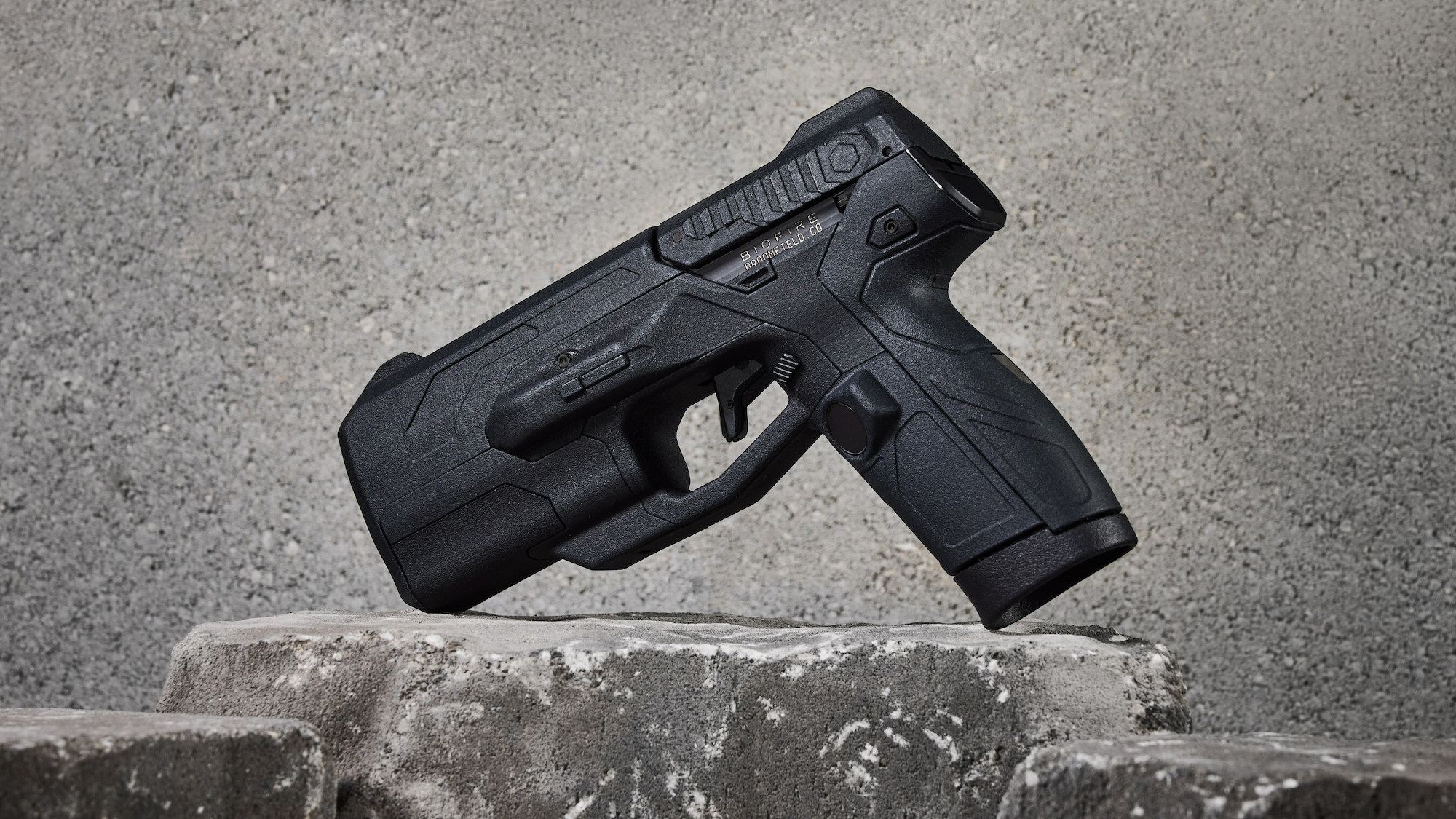

Reports from the Centers for Disease Control show gun violence is the leading cause of death among children and adolescents in the United States. In 2021, a separate study indicated over a third of its surveyed adolescents alleged being able to access a loaded household firearm in less than five minutes. When locked in a secure vault or cabinet, nearly one-in-four claimed they could access the stored gun within the same amount of time. In an effort to tackle this problem, a 26-year-old MIT dropout backed by billionaire Peter Thiel is now offering a biometrics-based solution. But experts question the solution’s efficacy, citing previous data on gun safety and usage.
Last Thursday, Kai Kloepfer, founder and CEO of Biofire, announced the Smart Gun, a 9mm pistol that only fires after recognizing an authorized user’s fingerprints and facial scans. Using “state-of-the-art” onboard software, Kloepfer claims their Smart Gun is the first “fire-by-wire” weapon, meaning that it relies on electronic signals to operate, rather than traditional firearms’ trigger mechanisms. Kloepfer claimed the product only takes “a millisecond” to unlock and said the gun otherwise operates and feels like a standard pistol, in a profile by Bloomberg. He hopes the Smart Gun could potentially save “tens of thousands of lives.”
In a statement provided to PopSci, Biofire founder and CEO Kai Kloepfer stated, “Firearm-related causes now take the lives of more American children than any other cause, and the problem is getting worse.” Kloepfer argued that accidents, suicides, homicides, and mass shootings among children reduced when gun owners have “faster, better tools that prevent the unwanted use of their firearms,” and claims the Smart Gun is “now the most secure option at a time when more solutions are urgently needed.”
[Related: A new kind of Kevlar aims to stop bullets with less material.]
Biometric scanning devices have extensive, documented histories of accuracy and privacy issues, particularly concerning racial bias and safety. Biofire claims that, to maintain the device’s security, the weapon relies upon a solid state, encrypted electronic fire control technology utilized by modern fighter jets and missile systems. Any biometric data stays solely on the firearm itself, the company says, which does not feature onboard Bluetooth, WiFi, or GPS capabilities. A portable, touchscreen-enabled Smart Dock also supplies an interface for the weapon’s owner to add or remove up to five users. The announcement declares the Smart Gun is “impossible to modify” or convert into a conventional handgun. The Smart Gun’s biometric capabilities are powered by a lithium-ion battery that purportedly lasts several months on a single charge, and “can fire continuously for several hours.”
According to Daniel Webster, Bloomberg Professor of American Health in Violence Prevention and a Distinguished Scholar at Johns Hopkins Center for Gun Violence Solutions, Biofire may have developed an advancement in gun safety, but Webster considers Biofire’s longterm impact on “firearm injury, violence, and suicide” to be “a very open ended question.”
[Related: Two alcohol recovery apps shared user data without their consent.]
“I’d be very cautious about [any] estimated deaths and injuries advertised by the technology,” Webster wrote to PopSci in an email. While Biofire boasts its safety capabilities, “Many of these estimates are based on an unrealistic assumption that these personalized or ‘smart guns’ would magically replace all existing guns that lack the technology… We have more guns than people in the US and I doubt that everyone will rush to melt down their guns and replace them with Biofire guns.”

Webster is also unsure who would purchase the Biofire Smart Gun. Citing a 2016 survey he co-conducted and published in 2019, Webster says there appears to be “noteworthy skepticism” among gun owners at the prospect of “personalized” or smart guns. “While we did not describe the exact technology that Biofire is using… interest or demand for personalized guns was greatest among gun owners who already stored their guns safely and were more safety-minded,” he explains.
[Related: Tesla employees allegedly viewed and joked about drivers’ car camera footage.]
For Webster, the main question boils down to how a Biofire Smart Gun will affect people’s exposure to firearms within various types of risk. Although he concedes the technology could hypothetically reduce the amount of underage and unauthorized use of improperly stored weapons, there’s no way to know how many new guns might enter people’s lives with the release of the Smart Gun. “How many people [would] bring [Smart Guns] into their homes because the guns are viewed as safe who otherwise wouldn’t?” he asks. Webster also worries Biofire’s new product arguably won’t deal with the statistically biggest problem within gun ownership.
While some self-inflicted harm could be reduced by biometric locks, the vast majority of firearm suicides occur via the gun’s original owner—according to Pew Research Center, approximately 54-percent (24,292) of all gun deaths in 2020 resulted from self-inflicted wounds. Additionally, guns within a home roughly doubles the risk for domestic homicides, nearly all of which are committed by the guns’ owners.
“Biofire is strongly committed to expanding access to safe and informed gun ownership and emphasizes the importance of education and training to every current and future gun owner,” the company stated in its official announcement. The company plans to begin shipping their Smart Gun in early 2024 at a starting price of $1,499, “in adherence with all applicable state and local regulations.”